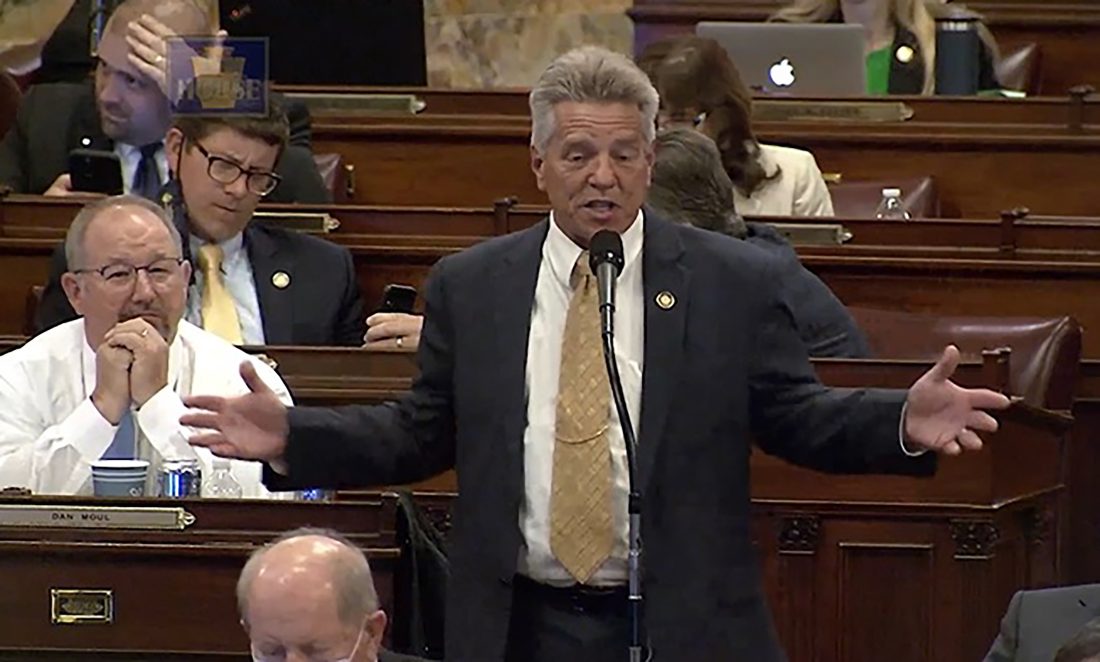Bill would ban critical race theory in schools

Rep. Russ Diamond, R-Lebanon, is pictured speaking on the state House of Representatives’ floor about constitutional amendments to restore checks and balances approval process for emergency declarations.
Several Republicans in the state House of Representatives are backing legislation to prohibit the teaching of “critical race theory” in Pennsylvania schools.
House Bill 1532 would enact the “Teaching Racial and Universal Equality Act” to include in state law that no Pennsylvania school district, public postsecondary institution, or state or local government entity shall teach that any race or sex is superior to another, that any individual based on their race or sex is inherently racist or sexist, or that any individual should receive favorable treatment or be discriminated against based on their race or sex.
The legislation is sponsored by Rep. Russ Diamond, R-Lebanon, and Rep. Barbara Gleim, D-Cumberland. There are 11 Republican co-sponsors.
“The manner in which important concepts such as racial and gender equality are taught in our schools could not be more important in defining the type of society we have,” Diamond and Gleim wrote in their legislative memorandum. “Teaching our children that they are inferior or inherently bad based on immutable characteristics such as race and sex can be extremely damaging to their emotional and mental well-being.”
Idaho, Oklahoma and Tennessee have passed similar pieces of legislation in recent days, according to the Associated Press, while at least 16 states are considering or have signed into law bills that would limit the teaching of certain ideas linked to “critical race theory,” which seeks to reframe the narrative of American history. Its proponents argue that federal law has preserved the unequal treatment of people on the basis of race and that the country was founded on the theft of land and labor.
The National Education Association and the National Council for the Social Studies oppose legislation to limit what ideas can be presented inside a classroom.
“It creates a very chilling atmosphere of distrust, educators not being able to be the professionals they are not only hired to be but are trained to be,” said Lawrence Paska, a former middle school social studies teacher in New York and executive director of the council.
Republicans have said concepts suggesting that people are inherently racist or that America was founded on racial oppression are divisive and have no place in the classroom.
Kimberle Crenshaw, executive director of the African American Policy Forum, was among those who helped popularize critical race theory in the 1970s and 1980s as a response to what she and others felt was a lack of progress following passage of civil rights legislation in the 1960s.
She said Republicans are twisting the concept to inflame racial tensions and motivate their base of mostly white supporters.
“This is a 2022 strategy to weaponize white insecurity, to mobilize ideas that have been mobilized again and again throughout history, using a concept or set of ideas that they can convince people is the new boogeyman,” Crenshaw said.
Diamond and Gleim point toward voters’ approval May 18 of a referendum to amend the state Constitution to outlaw discrimination based on race and ethnicity amid fears federal judges will roll back civil rights protections.
“Our schools should be teaching that every individual is equal under the law and that no individual should ever be labeled superior or inferior simply due to their race or genetic makeup, nor be held responsible for actions taken by others with similar traits,” Gleim and Diamond wrote. “Such teachings interfere with our constitutional duty to support and maintain a thorough and efficient system of public education to serve the needs of the Commonwealth.”




